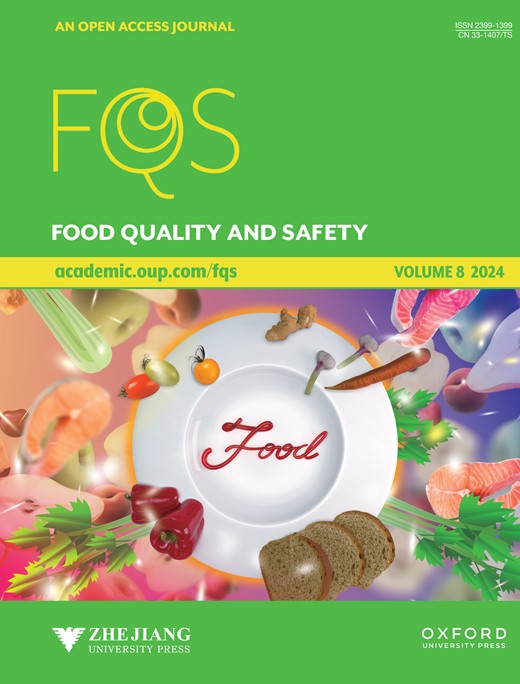Development of an Online Food Safety Toolbox Based on the Codex Alimentarius General Principles of Food Hygiene: Engaging Users Through Mapping, Chunking, and Learn-By-Asking
IF 3
3区 农林科学
Q2 FOOD SCIENCE & TECHNOLOGY
引用次数: 0
Abstract
The following describes developing and designing an online food safety toolbox that aims to elevate the food safety knowledge of Food Business Operators (FBO), competent authorities, and trainers. The material within the Food safety toolbox was based on the Codex Alimentarius (Codex) General Principles of Food Hygiene (GPFH), an internationally recognized primary food safety standard. The GPFH provides a guide to elements that should be considered when establishing good hygienic practices (GHP), which are subsequently managed through hazard analysis and critical control points (HACCP). To support the understanding of how to apply the principles of GHP and HACCP, the online Food Safety Toolbox was developed. This Toolbox was designed to enable users to access the principles quickly as a reminder for better understanding of more complex matters, conceptualizing, and building and maintaining food safety management systems. The learning approaches applied in the design of the Toolbox was mapping, chunking (grouping topics into a logic sequence to enable an incremental approach to learning) and Learn-By-Asking. The self-directed learning approach collectively enables the user to understand, categorize, and contextualize food safety information for practical use. Mapping was performed to identify the different elements within GPFH that formed the basis of the online platform and the categories in which basic information was provided for each. The material progresses into greater depth and includes links to detailed descriptions of the underlying science. This user-centric design was chosen to address different users' needs and reduce the entry barrier for contextually applying the presented GHP and HACCP practices. The GHP and HACCP Toolbox for Food Safety should be regarded as a reference resource rather than a training program to empower the user and ultimately enhance food safety practices.根据食品法典食品卫生通用原则开发在线食品安全工具箱:通过绘图、分块和 "边问边学 "让用户参与其中
下文介绍了在线食品安全工具箱的开发和设计情况,该工具箱旨在提高食品企业经营者(FBO)、主管当局和培训人员的食品安全知识水平。食品安全工具箱中的材料以食品法典(Codex Alimentarius)的《食品卫生通用原则》(GPFH)为基础,这是国际公认的主要食品安全标准。食品卫生通用原则为制定良好卫生规范(GHP)时应考虑的要素提供了指南,随后通过危害分析和关键控制点(HACCP)对其进行管理。为了帮助理解如何应用良好卫生规范和关键控制点原则,开发了在线食品安全工具箱。设计该工具箱的目的是使用户能够快速获取这些原则,以提醒他们更好地理解更复杂的问题、构思、建立和维护食品安全管理系统。在设计工具箱时采用的学习方法包括绘图、分块(将主题按逻辑顺序分组,以实现渐进式学习)和边问边学。这种自主学习方法可以帮助用户理解、归类和整理食品安全信息,以便实际使用。绘制了地图,以确定 GPFH 中构成在线平台基础的不同要素,以及为每个要素提供基本信息的类别。资料的深度不断加深,并包含指向基础科学详细说明的链接。选择这种以用户为中心的设计是为了满足不同用户的需求,并减少根据具体情况应用所介绍的 GHP 和 HACCP 实践的入门门槛。食品安全 GHP 和 HACCP 工具箱》应被视为一种参考资源,而不是培训计划,以增强用户的能力,最终提高食品安全操作水平。
本文章由计算机程序翻译,如有差异,请以英文原文为准。
求助全文
约1分钟内获得全文
求助全文
来源期刊

Food Quality and Safety
FOOD SCIENCE & TECHNOLOGY-
CiteScore
7.20
自引率
1.80%
发文量
31
审稿时长
5 weeks
期刊介绍:
Food quality and safety are the main targets of investigation in food production. Therefore, reliable paths to detect, identify, quantify, characterize and monitor quality and safety issues occurring in food are of great interest.
Food Quality and Safety is an open access, international, peer-reviewed journal providing a platform to highlight emerging and innovative science and technology in the agro-food field, publishing up-to-date research in the areas of food quality and safety, food nutrition and human health. It promotes food and health equity which will consequently promote public health and combat diseases.
The journal is an effective channel of communication between food scientists, nutritionists, public health professionals, food producers, food marketers, policy makers, governmental and non-governmental agencies, and others concerned with the food safety, nutrition and public health dimensions.
The journal accepts original research articles, review papers, technical reports, case studies, conference reports, and book reviews articles.
 求助内容:
求助内容: 应助结果提醒方式:
应助结果提醒方式:


